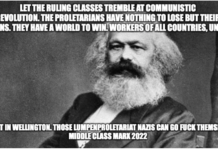I attended an event a couple of weeks ago organised by the New Horizons for Women Trust. Each year they give out scholarships for tertiary education to women who they describe as “inspiring”. Having been to the awards for two years in a row, there is no doubt that the women selected for the scholarships are indeed inspiring.
They are women who have had been through some difficult times, and have been making an effort to improve their situations through education. These women share their stories at the ceremony, and it is difficult to share your hard times with a crowd of people. They only share what they feel comfortable with, but it’s usually enough to show the level of courage and determination it takes for a person to pull themselves out of ugly circumstances. It also takes a lot of support from the community – family, friends, supporters.
What it shows is that individual success is dependent on collective effort. Success is much more likely if the individual has a supportive community and people who believe in them. This is something that the neo-liberal philosophy denies or at best ignores. And because, in that philosophy, individual success is determined to be solely a result of the efforts of the individual, the result is that failure can only be deemed to be as a result of the individual’s lack of effort.
Which then makes it acceptable to dismiss and denigrate those who don’t succeed (& of course that success is only ever measured in economic terms). The casual contempt and harsh judgement meted out to people who haven’t made it almost certainly creates an environment where those same people are much less likely to succeed.
This is because an atmosphere of contempt and judgement is what allows a government to enact policies which punish beneficiaries through harsh punitive measures and which remove supports like the training incentive allowance.
I remember someone telling me a long time ago that my children just needed one single person to believe in them, and if I could be that person, it was the most important thing I could do for them. Imagine taking that to a higher level: if a government believes in you and is willing to support you (through investment in education for example, or healthy housing), and in a manner that is positive and supportive, then your chances of success are a whole lot higher. As are the chances that you will want to contribute back to the society that has supported you.
The thing is that people aren’t perfect. They make mistakes, they do the wrong thing, sometimes they make bad choices. That’s a part of being human, and it shouldn’t mean that they no longer deserve our support. In fact, those are generally the times when they need the most support.
It’s time to bring back compassion and a sense of community to government, to policy-making and to policy implementation. For me, this is a major motivation in being actively involved in politics. It feels like a duty, a responsibility to push for change at a macro-level because it is only a political solution that can even begin to deal with the kinds of inequality that Nigel Latta covered in his documentary “The New Haves and Have Nots”. Its material that has been covered previously by Bryan Bruce and it’s good to have the issues highlighted again.
When we can create an environment where we support people at a societal level in the way New Horizons for Women Trust is doing for a handful of individuals, we’ll start to reverse some of that inequality. We can create that environment by changing the way we talk about success and failure and by challenging the contemptuous judgement that has become so commonplace. I think it’s one of the most important aspects of this election: it’s more than just a campaign to win government, it’s also about creating a movement for social and cultural change.
Anjum Rahman. – I fit into a lot of boxes – I’m an ethnic minority (born in india), a religious minority (muslim), and a woman. I’m a mother, an accountant, a political activist and a feminist. All of these form part of my identity to a greater or lesser degree. most of all though, I’m a rebel who refuses to fit neatly into boxes or to conform to the patterns that people expect of me.






Good on you Anjum. Good on you!
Yes compassion at the top has indeed gone.
Comments are closed.